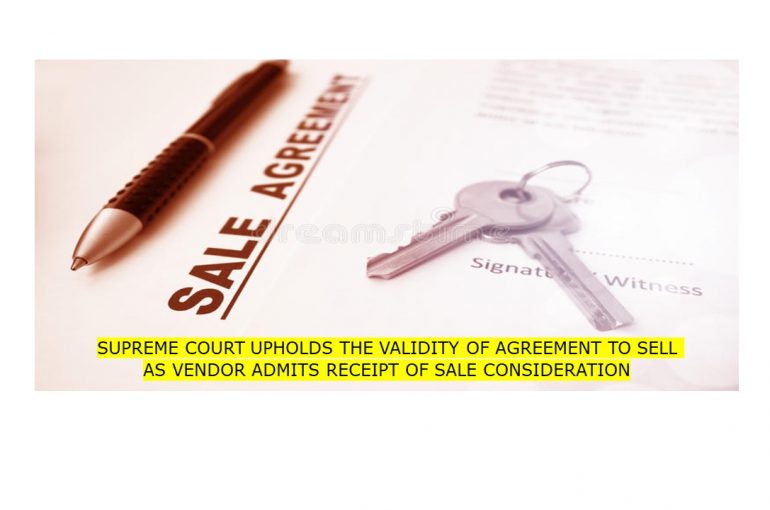SUPREME COURT UPHOLDS THE VALIDITY OF AGREEMENT TO SELL AS VENDOR ADMITS RECEIPT OF SALE CONSIDERATION
A Division Bench of the Supreme Court, comprising of Justice M.R. Shah and Justice B.V. Nagarathna, passed a Judgement dated 11.04.2022 while deciding the case of P. Ramasubbamma v. V. Vijaylakshmi & ors., Civil Appeal No. 2095 of 2022 and held that once the execution of agreement to sell and the payment/receipt of advance sale consideration is admitted by the vendor, thereafter nothing further is required to be proved by the vendee.
In this case, one, Ms. P. Ramasubbamma, the Appellant/ Plaintiff claimed to have entered into an Agreement to Sell on 12.04.2005 with Ms. V. Vijaylakshmi, the Respondent No.1 to purchase a property for Rs. 29 Lakhs and that she had made an advance payment of Rs. 20 Lakhs. The Respondent No. 1 had earlier executed a General Power of Attorney in favour of Respondent No. 2. The Respondent No. 1 and 2 approached the Appellant on 25.03.2008, asking an amount of Rs. 6 Lakhs to be paid for execution of the Agreement. The said amount was paid by the Appellant and an acknowledgement of receipt was issued by the Respondent No. 1. However, the Sale Agreement was not executed in favour of the Appellant. Eventually, the Appellant learnt that the Respondent No. 2 by using the Power of Attorney, executed 2 Sale Agreements dated 03.05.2010 in favour of Respondent No. 3 and 4. Thereafter, the Appellant served a Legal Notice upon Respondent No.1 for executing the Sale Agreement in its favour. The Respondent No. 1 did not comply to the said Legal Notice and the Sale Agreement was not executed.
The Appellant, thus, filed a Suit for Specific Performance of Contract/ Agreement to Sell before the First Additional Senior Civil Judge at Bellary, Karnataka (Trial Court) in O.S.NO.103/2010. The Respondent No. 1 in her written statement admitted to have entered into an Agreement to Sell with the Appellant and undertook to perform her part of the Contract. However, the Respondent No. 2 to 4, contested the Suit on the ground that the said Agreement to Sell is a created document and not a true one. The Agreement between the Appellant and the Respondent No. 1 could not have been executed without cancelling the registered Power of Attorney.
The Trial Court, after appreciating the evidence and the witnesses placed on record, passed a Decree for Specific Performance of the Contract vide Order dated 01.12.2014 on the ground that the Respondent No. 1 who is the original owner of the Suit Property has admitted to have entered into the Agreement to Sell with the Appellant.
The Respondent No. 3 and 4, preferred an Appeal against the Trial Court Order dated 01.12.2014 before the High Court of Karnataka at Dharwad. The High Court allowed the Appeal and set aside the Trial Court Order vide Order dated 20.07.2021.
The Appellant preferred an Appeal against this Order of the High Court, before the Supreme Court. The Respondents did not contest the Appeal and hence the Apex Court proceeded ex-parte.
The Supreme Court, observed that Respondent No.1 is the original owner of the Suit Property and has admitted to have entered into a Contract for Sale with the Appellant. The Respondent No.1 has also admitted to the receipt of substantial advance sale consideration. The Apex Court made the observation that once the execution of agreement to sell and the
payment/receipt of advance substantial sale consideration was admitted by the vendor, thereafter nothing further was required to be proved by the Appellant/ vendee.
The Supreme Court observed that the Trial Court specifically gave the finding on the basis of evidence, that the sale deed executed by the Respondent No. 2 in favour of Respondent No. 3 and 4, would not be binding on Respondent No. 1 and the Appellant. The Trial Court also made the finding that the alleged sale consideration paid by Respondent No. 3 and 4 to Respondent No. 2 for executing Sale Deeds dated 03.05.2010 have not been established and proved by Respondent No. 2 to 4. Therefore, there was a specific finding given by the Trial Court on appreciation of evidence that Sale Deeds dated 03.05.2010 were nominal sale deeds. The Apex Court also observed that the Trial Court has specifically found that the stamp papers of Agreement to Sell dated 12.04.2005 was purchased in the name of Respondent No. 2 and therefore Respondent No. 2 was aware and had knowledge of Agreement to Sell dated 12.04.2005 executed in favour of the Appellant. It was also observed that the Respondents did not reply to the Legal Notice served by the Appellant before filing the Suit.
The Supreme Court then referred to the case of Lala Durga Parsad and Anr. Vs. Lala Deep Chand and Ors., 1954 SCR 360, in which it was held that, “In our opinion, the proper form of decree is to direct specific performance of the contract between the vendor and the plaintiff and direct the subsequent transferee to join in the conveyance so as to pass on the title which resides in him to the plaintiff. He does not join in any special covenants made between the plaintiff and his vendor; all he does is to pass on his title to the plaintiff. This was the course followed by the Calcutta High Court in Kafiladdin v. Samiraddin [AIR 1931 Cal 67] and appears to be the English practice. We direct accordingly.”
Therefore, the Apex Court held that once the execution of Agreement to Sell and the payment/receipt of advance substantial sale consideration has been admitted by the Respondent No. 1-Vendor, thereafter nothing further is required to be proved by the Appellant-Vendee. In view of the said observations, the Supreme Court allowed the Appeal and thereby set aside the High Court Judgement dated 20.07.2021 and restored the Trial Court Order dated 01.12.2014.
Anuradha Kumari
Associate
The Indian Lawyer & Allied Services





































Leave a Reply